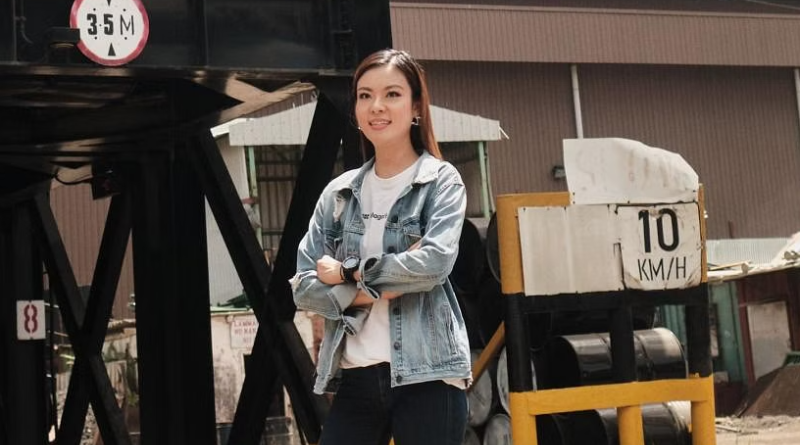Recycling plastics into roads: How 29-year-old is paving a greener future for Singapore
Photo: Ms Oh Chu Xian, the founder of social enterprise Magorium, has come up with a technology to divert plastic waste into NEWBitumen, which is used to build roads. PHOTO: SPH MEDIA
The founder of tech start-up Magorium developed a sustainable material that uses plastic – even those deemed “unrecyclable” – to construct our roads, instead of relying on crude oil
Using what was deemed as unrecyclable plastic to build our roads – that is what Ms Oh Chu Xian’s tech start-up is doing to make Singapore greener.
The 29-year-old founder of Magorium developed a novel technology which converts plastic waste into a material called NEWBitumen, to build roads.
This innovative solution processes various types of plastic including those that are contaminated, such as medical waste from hospitals.
Ms Oh explains: “This waste, for the longest time, has been considered unrecyclable, both in Singapore and other parts of the world. But we’ve been able to do it and divert tens of thousands of kilograms of plastic waste from Singapore’s incineration”.
In 2022, for instance, Magorium diverted more than 8,000 kg of plastic waste from incineration when they completed a green driveway at DBS Newton Green using NEWBitumen.
With Magorium, Ms Oh aims to build a sustainable future by enabling businesses and developers to dispose of their plastic waste responsibly, quickly and affordably. This is crucial as a whopping 95 per cent of plastic waste goes unrecycled in Singapore.
“My mission has always been to increase Singapore’s recycling rate by using plastic as a resource, rather than treating it as waste.”
Growing up in a family business that produced materials for road construction laid the foundation for Ms Oh’s “mission”.
“My family business exposed me to the built environment sector and how most infrastructure that has been developed was at the expense of mining resources from our earth,” she shares.
Coupled with her realisation that countries like Singapore lack robust recycling capabilities – exporting much of their waste and incinerating the rest – this sparked her desire to create an inter-industry solution.
She established Magorium in 2019 as a social enterprise, to ensure that growth aligns with creating meaningful social and environmental impact. “Social enterprises have the responsibility of ensuring that we are creating the corresponding social and environmental impact, while scaling revenue and profit. It creates an additional layer of accountability.”
Breaking new ground
Eight years ago, Ms Oh began researching the technology to create NEWBitumen. However, convincing industry veterans of its viability was tough.
Established construction methods rely on the earth’s natural resources, such as crude oil, to make materials. This long-standing reliance makes change difficult.
“There was a general sense of dismissiveness and resistance to trying something new in both the waste management and built environment sector,” she says, though she understood their reluctance to take risks.
“However, since we are living in a climate where change is increasingly necessary to survive, I believe it is time to fix something that is broken,” she adds.
“To convince the owner to give us a shot, we gave a discount, issued a warranty to fix things if they go wrong, and offered test reports to show that the new road would work like a normal one,” she recalls. “After that, we started to become more credible in the eyes of older and more experienced professionals.”
One small win led to another, and Magorium was awarded the DBS Foundation Grant in 2021. Since 2014, the DBS Foundation has provided grant funding to 140 social enterprises and SMEs to scale their business models and deepen their impact.
Pushing past the sceptics
There was a general sense of dismissiveness and resistance to trying something new in both the waste management and built environment sector. However, since we are living in a climate where change is increasingly necessary to survive, I believe it is time to fix something that is broken.
Becoming a leader
Ms Oh co-founded Magorium with her younger sister Shu Xian, who helms the impact and business development unit. The other five core members of the team are staff who have worked with her family for 30 years. They are in charge of research and operations.
She finds that having a team of more experienced people works in her favour. Their decades of industry knowledge have helped her to expedite “in terms of scaling, commercialising and piloting all our various materials”.
As someone who believes in a dynamic leadership style, Ms Oh does not lay down hard rules on how she wants to work as the founder of the start-up.
She says: “Good leadership is not about telling people what you want and expecting to see it, but observing what’s required at that point of time, and being able to adapt and be resilient.”
“I’ve learnt that there are different ways to achieve the same objective. And when things don’t work out, it’s important to be creative to try and turn things around.”
For instance, when she realised it was not economically viable to buy plastic waste for recycling, she reached out to partner organisations eager to recycle but unsure of the process, to maintain her supply chain.
Scaling up the business capacity, while keeping quality and cost control in mind, remains a challenge.
“We’re balancing many essential factors, including the cost, quality and eventual impact we want to create for Singapore’s recycling rates. We need to scale at a speed that makes sense economically, yet remain ahead of potential competition,” explains Ms Oh.
Broadening her impact
Ms Oh’s journey in pushing for environmental accountability through her work goes beyond recycling plastic waste and building green roads in Singapore.
Through collaborations with schools, she hopes to nurture younger ones to become more environmentally conscious.
She explains: “While we provide the technology to recycle and valorise waste, it means nothing without the community, private and public sector coming together to utilise it. I hope to further equip and educate the next generation, empowering them to create the impact they wished the previous generation had.”
What’s next for Magorium?
Ms Oh is looking to scale the technology and expand the enterprise’s impact internationally, particularly within South-east Asia, “to help them better manage their waste while giving them capabilities to pave green roads”.
Source: straitstimes.com




